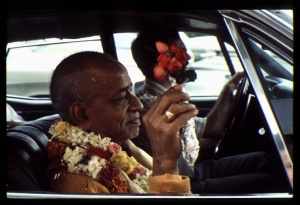SB 5.5.4

A.C. Bhaktivedanta Swami Prabhupada
TEXT 4
nūnaṁ pramattaḥ kurute vikarma
yad indriya-prītaya āpṛṇoti
na sādhu manye yata ātmano 'yam
asann api kleśada āsa dehaḥ
SYNONYMS
nūnam—indeed; pramattaḥ—mad; kurute—performs; vikarma—sinful activities forbidden in the scriptures; yat—when; indriya-prītaye—for sense gratification; āpṛṇoti—engages; na—not; sādhu—befitting; manye—I think; yataḥ—by which; ātmanaḥ—of the soul; ayam—this; asan—being temporary; api—although; kleśa-daḥ—giving misery; āsa—became possible; dehaḥ—the body.
TRANSLATION
When a person considers sense gratification the aim of life, he certainly becomes mad after materialistic living and engages in all kinds of sinful activity. He does not know that due to his past misdeeds he has already received a body which, although temporary, is the cause of his misery. Actually the living entity should not have taken on a material body, but he has been awarded the material body for sense gratification. Therefore I think it not befitting an intelligent man to involve himself again in the activities of sense gratification by which he perpetually gets material bodies one after another.
PURPORT
Begging, borrowing and stealing to live for sense gratification is condemned in this verse because such consciousness leads one to a dark, hellish condition. The four sinful activities are illicit sex, meat-eating, intoxication and gambling. These are the means by which one gets another material body that is full of miseries. In the Vedas it is said: asaṅgo hy ayaṁ puruṣaḥ. The living entity is not really connected with this material world, but due to his tendency to enjoy the material senses. he is put into the material condition. One should perfect his life by associating with devotees. He should not become further implicated in the material body.